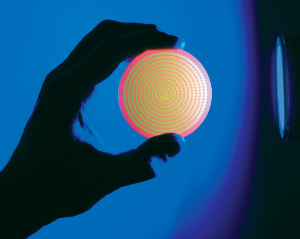Jan 24 2011
California-based company, Intematix has introduced a new range of ChromaLit products that provide individual phosphor component. The component modifies the blue light of LED sources into white light.
 Intematix's Separate Phosphor Component
Intematix's Separate Phosphor Component
Phosphor is a natural luminescent compound that is utilized in all LED bulbs and luminaires. It is normally in powder form and is coated directly onto the surface of LED light sources, which are semiconductors that produce illumination when electric current is transported via them. However, the ChromaLit is an individual component that resembles like a disk. This feature enables ChromaLit to be used with LED luminaires with various shapes such as curved and 3D LED luminaires.
The separate phosphor component has an energy efficiency of up to 30%. Light manufacturers can switch in numerous phosphor components on the same LED illumination source to produce products with varied color rendering index and color temperature.
Mark Swoboda, Chief Executive Officer at Intematix said that a separate phosphor part could increase the performance and lifespan of LEDs, as the reflected light can be produced around the component sides, while the coated phosphor on an LED illumination source usually reflects most of the light onto the semiconductor light source.
Intematix is planning to target the ChromaLit at both residential and commercial LED light producers.